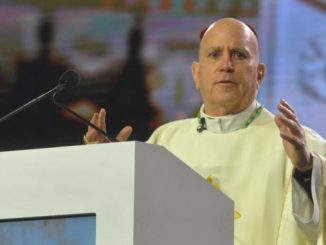
What is a conference of bishops? A CNA Explainer

Springfield, Ill., Oct 24, 2019 / 07:01 pm (CNA).- The role of president in a bishops’ conference is not as powerful as one may assume, Bishop Thomas Paprocki of Springfield in Illinois told CNA Wednesday.
“It’s important to understand that the bishops’ conference is not some kind of a regulatory body or a supervisory body,” Paprocki told CNA Oct. 23.
The conference, in fact, “doesn’t have any authority over bishops in their own diocese.”
While it would be easy to draw comparisons between the United States Conference of Catholic Bishops and the United States Congress, Paprocki said that this was not at all the proper analogy for a bishops’ conference.
It is not normally the role of the USCCB to create or pass legislation, the bishop said.
“The meetings of bishops are not normally legislators–I say normally because there are some exceptions to that, and the exceptions are very narrowly defined in Canon 455,” he explained.
These exceptions include setting certain transactional thresholds or the age of confirmation, as well as voting on a specific issue with the permission of the Holy See.
“An example of (the latter) would be the Essential Norms that the bishops adopted in Dallas in 2002, for the protection of minors that was in conjunction with the Charter for the the Protection of Children and Young People,” he said.
“So the Charter is an example of a voluntary document that the bishops adopted.”
A conference of bishops, Paprocki said, is a “grouping of bishops in a region or in a country that comes together for joint pastoral activities.”
These joint pastoral activities mostly involve “advocacy type efforts,” he said.
“That’s, that’s basically what the conference tries to do–the bishops working together as equals.”
The president of a bishops’ conference has more of an advisory role than anything else, said Paprocki.
While the president would author statements from the conference, as well as keep the general assemblies running in an orderly fashion, he does not have supervisory authority over other bishops in their dioceses, nor does the president alone set the agenda for the general assemblies.
“It’s not really an authoritarian position,” said Paprocki. “That position is not like a supervisor of the other bishops and in that sense of mission.” Bishops are only accountable to the pope, Paprocki said, who is represented in the United States by an apostolic nuncio.
Paprocki is one of 10 bishops who have been listed as candidates for the upcoming presidential and vice-presidential elections at the United States Conference of Cathoilc Bishops. Candidates are nominated by their brother bishops, and Paprocki told CNA he was “quite surprised” to see his name put forward.
The current USCCB president, Cardinal Daniel DiNardo of Galveston-Houston, will conclude his term at next month’s general assembly in Baltimore. Typically, the vice president of the USCCB is voted in to lead the conference for the next term. Archbishop Jose Gomez of Los Angeles is the conference’s vice president.






